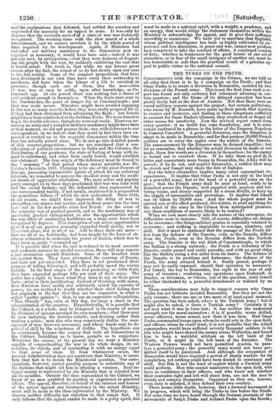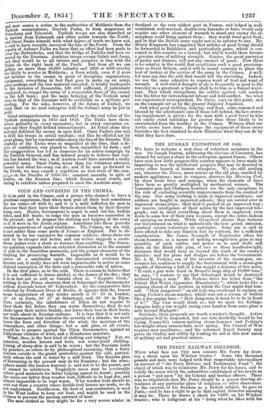THE TURKS ON THE PRITTH.
CONCURRENTLY with the campaign in the Crimea we are told on all sides that there is to be a campaign on the Pruth; and that Omar Pasha is to create a diversion in Bessarabia' assisted by two divisions of the French army. This is not the first time such a re- port has found not only currency but vehement advocacy in cer- tain quarters ; and the blame of its delayed execution has been pretty freely laid at the door of Austria. Not that there were no sound military reasons against the project; but certain politicians, who swear by Al. Kossuth, have made up their minds that Austria is evasive and insincere, and finding in these allegations sufficient to account for Omar Pasha's idleness, they overlooked or forgot all other causes for inactivity. Now the revived report comes from every quarter ; it no doubt has some foundation, and is to some extent confirmed by a phrase in the letter of the Emperor Napoleon to General Canrobert. A powerful diversion, says the Emperor, is about to be made in Bessarabia ; and for that purpose 20,000 French soldiers are to carry the eagles over the waters of the Danube. The announcement by the Emperor may be deemed impolitic; but let us remember, that whether the actual diversion be made or not made, these few words are a diversion in themselves ; for the enemy is bound not to overlook them. If he take them an pied de la lettre and concentrate more troops in Bessarabia, the Allies will be served; if he do not, and neglect Bessarabia' a sudden blow may be struck and Ismail may share the fate of Baclajoz.
But the latter alternative implies many other concomitant cir- cumstances. It implies that Omar Pasha is not only at the head of a powerful army, but at the head of a powerful army on the spot ; that the French army shall be near at hand, ready to be launched across the Danube, well supplied with pontoon and bat- tering trains, and closely supported by a steam flotilla, to keep up the supply of ammunition and provisions. It implies that Ismail can be taken by 20,000 men. And the whole project must be carried out, or the effect produced, this winter, to avail anything for the relief of the army in the Crimea from anticipated pressure. Are these conditions of success likely to be realized? When we look more closely into the nature of the enterprise, its difficulties seem to increase. Still, of course, difficulties are things to be overcome—the things military genius is especially retained to overcome ; and nothing is impossible to courage, numbers and skill. But it must be confessed that the passage of the Pruth dif- fers from the defence of the Danube, even as the Danube differs from the Truth, even as the B,ussian differs from the Turkish army. The Danube is the wet ditch of Constantinople to which the Balkan is a strong outwork ; the Pruth is a tributary of the Danube, easily passed and easily passable, and with no great ridge like the Balkan rising a few miles from its banks. The defence of the Danube is its positions and fortresses ; the defence of the Pruth, the army arrayed behind it. Easily passed, perhaps it may not be easily repassed, should that operation be necessary. For Ismail, the key to Bessarabia, lies right in the rear of any army of invasion ; rendering any operations upon Kicheneff, or Bender, or Akerman or Odessa, out of the question, until Ismail be either blockaded by a. powerful detaohment or reduced by an army. These considerations may help to suggest reasons why Omar Pasha has not hitherto invaded Bessarabia. But they are not the only reasons ; there are one or two more of at least equal moment. The question has been asked, where is the Turkish army ? but it might also be asked, is there a Turkish army ? Certainly it is not now what it was in Tune last; it has neither the numerical strength nor the moral animation ; it is, if possible, worse drilled, worse officered, worse armed; now than it was then. Had Omar Pasha commanded troops upon whom he could rely in the open field, and officers whom he could trust, it is not probable that the Allied commanders would have suffered seventy thousand soldiers to lie idle who might have chased the enemy across Wallachia, and forced him to keep a watchful attitude on the left bank of the Pruth, or it might be the left bank of the Dniester. The Western Powers would not have permitted Austria to para- lyze a powerful army ; the powerful army would not have per- mitted itself to be paralyzed. And although the occupation of Bessarabia would have required a period of steady warfare for its completion, yet nothing could have been denied to constancy and skilL But this is not the kind of exploit which a Turkish army could perform. Men who cannot manoeuvre in the open field, who have no confidence in their officers, and who know not whether their comrades right and left will stand firm, are not the men to invade and conquer Bessarabia. Organized as they are, honour, even duty is satisfied, if they defend their own country. There seems little doubt, however, that a forward movement is in progress, which will bring the Turks in line before the Pruth. For some time we have heard through the German journals of the movements of Sadyk Pasha and Aohmet Pasha upon the fiereth ;
and now comes a notice to the authorities of Moldavia from the Turkish commissioner, Dervish Pasha, to form magazines at FokschanY and Tekoutch. Turkish troops are also described as in motion from Kalarasch and other points towards the North; and Omar Pasha himself, with what degree of truth we know not, is said to have recently surveyed the line of the Pruth. From the reports of Achmet Pasha we learn that an effort had been made to clear the Dobrudscha, and that the bridge at Tultcha had been re- moved by the Russians. Austrian troops occupy Galatz and Jassy, and they would be to all intents .and purposes in line with the Turks on the right bank of the Pruth. But from all we can g,ather, no more than 40,000 infantry and 3000 or 4000 cavalry are likely to muster in Moldavia; a force which, even if it were not inferior to the enemy in point of discipline, organization, equipment, everything in fact that goes to make up an army, guns perhaps and the raw material excepted, is totally inadequate to the invasion of Bessarabia, bit still sufficient, if judiciously employed, to compel the array of a respectable force of the enemy on the left bank ; and the mere bringing of the Turkish army close to that of the Russians will be creditable as a military pro- ceeding. For the sake, however, of the future of Turkey, we trust that on no mad enterprise will the Sultan's army be put in peril. Great misapprehension has prevailed as to the real value of the Turkish campaigns in 1853 and 1854. The Turks bore them- selves gallantly in every encounter; but in every encounter ex- cept one they fought behind intrenchments. At Zetati alone they met and defeated the enemy in open field. Omar Pasha's aim was to drill his troops in actual combats ; and this he effected not by great plans, but by constant sallies along the line of the Danube. The exploits of the Turks were so magnified at the time, that a de- grce of confidence was placed in them unjustified by facts ; and this exaggeration has led to clamours for an active campaign by the Turkish General, and has induced people to believe that Aus- tria has barred the way; as if Austria could have arrested a really powerful army. Omar Pasha, wiser than his volunteer advisers, -news best what his army can do ; and if he now go forward to the Pruth, we may expect a repetition on that river of the cam-
on the Danube of 1853-'54: constant assaults, in spite of winter, on the Russian line; which Russia must watch, not daring to retaliate unless prepared to meet the Austrian army.



































 Previous page
Previous page